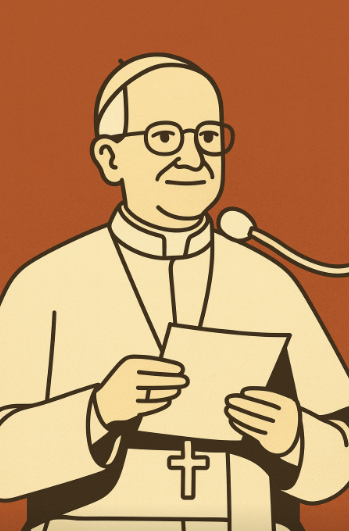
Pope Leo’s Challenge: What Does It Truly Mean to Be ‘Pro-Life’?
In a surprising move, Pope Leo XIV entered into a heated U.S. church debate over abortion and immigration, urging Catholics to think more deeply about what it means to be truly “pro-life.”
It all began when Cardinal Blase Cupich in Chicago proposed giving a lifetime achievement award to Senator Dick Durbin, in recognition of his work on behalf of immigrants. But many conservative bishops objected, pointing out Durbin’s public support for abortion rights.
When asked about this, Pope Leo called first for mutual respect among Catholics. Then he said something that turned heads:
“Someone who says ‘I’m against abortion but says I am in favor of the death penalty’ is not really pro-life. Someone who says that ‘I’m against abortion, but I’m in agreement with the inhuman treatment of immigrants in the United States,’ I don’t know if that’s pro-life.”
In short: opposing abortion is not enough. To be fully pro-life, one must also stand against other actions or policies that demean human dignity.
Soon after, Durbin declined the award.
Why This Matters: The “Seamless Garment” & the Consistent Ethic of Life
Pope Leo’s remarks echo a long-standing Catholic moral tradition sometimes called the “seamless garment” or consistent ethic of life. This idea was championed by Cardinal Joseph Bernardin in the 1980s.

Bernardin used the image of a seamless garment—the tunic of Christ—to suggest that all life issues are interconnected. You can’t pick and choose which threads to protect or pull without weakening the whole.
According to the consistent ethic:
- Defending unborn life is essential — but so is caring for the poor, migrants, the elderly, the sick, and opposing violence and injustice.
- A consistent ethic does not equate all life issues as identical in gravity. Rather, it sees them as part of one moral vision of human dignity.
As one Catholic writer put it:
“You can’t protect some life and not others.”
The “seamless garment” approach has also been debated and refined over the years. Some have said it risks being too broad or diffused; others say it helps the Church avoid picking sides in politics by remembering a wide view of life issues.
Church Teaching, Popes, & Recent Developments
To understand why Pope Leo’s words carry weight, here’s how they tie into official Church teaching:
Abortion & The Gospel of Life
- Evangelium Vitae (“The Gospel of Life,” 1995) by Pope John Paul II is a foundational papal document affirming that human life is sacred from conception to natural death. It addresses abortion, euthanasia, capital punishment, and more.
- John Paul II insisted that society must protect life even when it is vulnerable, and he called for legal structures and cultural change to respect life at all stages.
Capital Punishment
- Over recent decades, the Church’s teaching has shifted. While older catechisms allowed the death penalty in extreme cases, more recent statements reject it as inadmissible in all cases because it contradicts human dignity.
- Pope Francis made that clear: the death penalty “is inadmissible” under any circumstances.
Immigration & Dignity of Persons
- Catholic social teaching has long called on Christians to “welcome the stranger,” treat migrants humanely, and defend their rights.
- Pope Francis in particular has repeatedly emphasized solidarity with migrants, the poor, and displaced persons in his encyclicals and speeches.
Thus, when Pope Leo links abortion, capital punishment, and immigration in a single ethical argument, he is drawing on this broader tradition of the Church — not inventing something new.
What Pope Leo’s Words Challenge Us To Do
Here are a few takeaways his remarks invite:
- Broaden our moral vision. Being pro-life should not focus exclusively on one issue. A coherent ethic honors every human life, especially the most vulnerable.
- Avoid double standards. If one rejects abortion yet supports policies or laws that harm migrants or backs capital punishment, one’s “pro-life” claim is incomplete.
- Dialogue over division. Pope Leo called for respect, conversation, and for Catholics to “search together” toward the way forward.
- Holding tension. It’s not easy: different moral issues may demand different responses. The consistent ethic doesn’t erase differences; it asks us to see them in relation to each other.